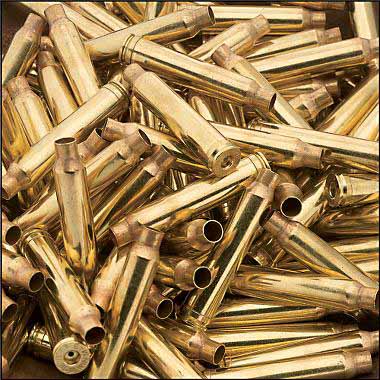
Pictured is a small sample of once-fired .308 military brass. The military regularly generates millions of rounds of fired brass that has traditionally been sold as surplus. Much of this brass is reloaded for civilian and police use
From the March 2009 Idaho Observer:
DoD policy to destroy surplus ammo casings reversed
 Pictured is a small sample of once-fired .308 military brass. The military regularly generates millions of rounds of fired brass that has traditionally been sold as surplus. Much of this brass is reloaded for civilian and police use |
One man, with an organization behind him, working with his senators, quickly reversed a new military policy to mutilate surplus brass to make it unsuitable for reloading. Gary Marbut, president of the Montana Shooting Sports Association (MSSA) (www.mtssa.org) contacted his Democrat senators Jon Tester and Max Baucus, to inform them of the new policy and the ramifications it was having on ammunition supply. The senators faxed a letter to the Department of Defense (DoD), which responded to the senators, saying that they had reversed the new policy to mutilate spent shell casings before they were sold as surplus.
The senators argued that, "prohibiting the sale of fired military brass would reduce the supply of ammunition–preventing individual gun owners from fully exercising their Second Amendment right to keep and bear arms. We urge you to address this situation promptly."
Mark Cunningham, a legislative affairs representative with the Defense Logistics Agency, explained to Sen. Tester’s office that the DoD had placed small arms cartridge cases on its list of sensitive munitions items as part of an overall effort to ensure national security is not jeopardized in the sale of any Defense property. The small arms cases were identified as a sensitive item and were held pending review of policy, he said.
"Upon review, the Defense Logistics Agency has determined the cartridge cases could be appropriately placed in a category of government property allowing for their release for sale," Cunningham wrote.
The fired cartridges can be reloaded numerous times. The brass can be directly recycled at home by individual reloaders or by ammunition remanufacturing facilities, saving money and energy. New brass is usually the most expensive component of loaded ammunition.
One of the companies that brought attention to the issue is Georgia Arms which, for the last 15 years, has been purchasing fired brass casings from the DoD and private government surplus liquidators. The military collects the discarded casings from fired rounds, then sells them through liquidators to companies like Georgia Arms that remanufacture the casings into ammunition for the law enforcement and civilian gun owner communities.
Earlier this month, Georgia Arms received a canceled order, informed by its supplier that the government now requires fired brass casings be mutilated to a scrap metal state.
The policy compelled Georgia Arms to cancel all sales of .223 and .308 ammunition until further notice. Sharch Manufacturing, Inc., had announced the same cancellation of its .223 and .308 brass reloading components.
"They just reclassified brass to allow destruction of it, based on what?" Georgia Arms owner Larry Haynie asked WordNetDaily Reporter Drew Zahn. "We’ve been ‘going green’ for the last dozen years, and brass is one of the most recyclable materials out there. A cartridge case can be used over and over again. And now we’re going to destroy it based on what? They don’t want the civilian public to have it? It’s a government injustice."
~With thanks to WorldNetDaily for covering this story.